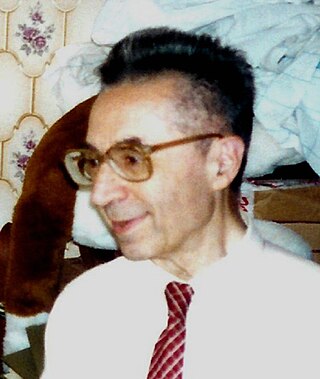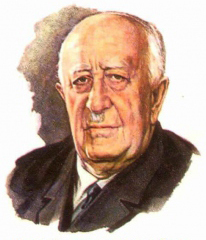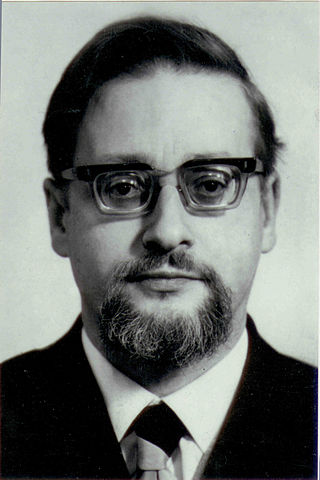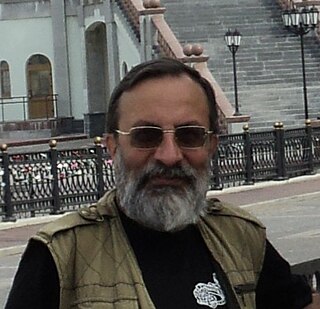Thomas Andrew Bailey was a professor of history at his alma mater, Stanford University, and wrote many historical monographs on diplomatic history, as well as the widely used American history textbook, The American Pageant. He was known for his witty style and clever terms he coined, such as "international gangsterism." He popularized diplomatic history with his entertaining textbooks and lectures, the presentation style of which followed Ephraim Douglass Adams. Bailey contended foreign policy was significantly affected by public opinion, and that current policymakers could learn from history.

Yuri Nikolaevich Kholopov was a Russian musicologist and educator.
Oleg Nikolayevich Trubachyov was a Russian linguist. A researcher of the etymology of Slavic languages and Slavic onomastics, he was considered a specialist in historical linguistics and lexicography. He was a Doctor of Sciences in Philological Sciences, an academician of the Russian Academy of Sciences and served as the editor-in-chief of the Etimologiya yearbook. His works are on the etymology of Slavic languages and on East Slavic onomastics.

Vladimir Nikolayevich Sukachev was a Russian geobotanist, engineer, geographer, and corresponding member (1920) and full member (1943) of the USSR Academy of Sciences. His wife was Henrietta Ippolitovna Poplavskaja.
The Academy of Sciences of Turkmenistan is a state body in Turkmenistan founded in 1951, which is responsible for the implementation of Turkmen scientific and technical policy. The academy was closed under president Saparmurat Niyazov and reopened by his successor, Gurbanguly Berdimuhamedow.

Igor Yakovlevich Birman was a Russian-American economist. He received his Ph.D. in 1960. He authored a number of books translated into four languages and some 200 articles in professional periodicals and also in the popular press.

Sergey Olegovich Kuznetsov is a Russian historian and art historian, specialising in the history of the Stroganov family.

Alex Battler, known in Russia under the pen name Oleg Alekseyevich Arin, is a Soviet-born Russian-Canadian scholar and political writer. He is a member of the organization «Defend Science» (US).
Alex Lissitsa is a Ukrainian public figure, specializing in the agribusiness and food industry sectors of the economy. He currently serves as the president of the Ukrainian Agribusiness Club.
Olga Nikolaevna Bondareva was a distinguished Soviet mathematician and economist. She contributed to the fields of mathematical economics, especially game theory.

The Etymological Dictionary of Slavic Languages: Proto-Slavic Lexical Stock is an etymological dictionary of the reconstructed Proto-Slavic lexicon. It has been continuously published since 1974 until present, in 43 volumes, making it one of the most comprehensive in the world.

Yuri Andreevich Yappa was a Soviet and Russian theoretical physicist. He is known for publications on particle physics, quantum field theory, General Relativity, philosophy of science, and for his graduate texts on classical electrodynamics and theory of spinors.
Vladimir Semionovich Spirin was a Russian philologist, sinologist, historian, primarily interested resided in classical Chinese philology and Chinese philosophy. Throughout his career he was a lecturer of Saint Petersburg State University, researcher at Saint Petersburg's branch of the Institute of Oriental Studies of the Russian Academy of Sciences, Saint Petersburg Russia, Candidate of Sciences.

Yuriy Ivanovich Semenov was a Soviet and Russian historian, philosopher, ethnologist, anthropologist, expert on the history of philosophy, history of primitive society, and the theory of knowledge. He was also the original creator of the globally-formation (relay-stadial) concept of world history and is a Doctor of Philosophy, Doctor of Historical Sciences (1963), and Professor. He was Distinguished Professor at the Moscow Institute of Physics and Technology.

Vladimir Petrukhin is a Russian historian, archaeologist and ethnographer, Doctor of Historical Sciences, chief research fellow of the Medieval Section in the Institute of Slavic Studies in the Russian Academy of Sciences, professor of Higher School of Economics.

Vladimir Mstislavovich Pentkovski was a Soviet-American computer scientist, a graduate of the Moscow Institute of Physics and Technology and winner of the highest former Soviet Union's USSR State Prize (1987). He was one of the leading architects of the Soviet Elbrus supercomputers and the high-level programming language El-76. At the beginning of 1990s, he immigrated to the United States where he worked at Intel and led the team that developed the architecture for the Pentium III processor. According to a popular legend, Pentium processors were named after Vladimir Pentkovski.
Nina Yakovlevna Dyakonova was a Russian researcher of 19th century English and European literature, full professor, Doctor of Philology, member of the Board of Directors of the International Byron Society, and member of the editorial board of the Russian academic book series Literaturniye pamyatniki. She was an authority in the history of English literature and links between European literatures with each other and with Russian literature, especially of the 19th century, following her professor Mikhail P. Alexeyev.
Albina Khakimovna Girfanova, was a Russian linguist and anthropologist. She worked at the Institute for Linguistic Studies, Russian Academy of Sciences, and later at Saint Petersburg State University, where she attained the rank of Docent. Girfanova is most known for her work on Udege and Oroch languages, as well as on a number of other Tungusic languages and Balkan languages. She is the author of the most significant vocabulary of Udege, published in Russia, as well as other important studies and reference sources of Udege, Oroch and Balkan languages.
Galina Stepanovna Nikitina — Soviet lawyer and orientalist, Candidate of Juridical Sciences (1953), Doctor of Historical Sciences (1977), author of the book «The State of Israel» – the first monographic study in Soviet literature of the history and economics of the state of Israel.










